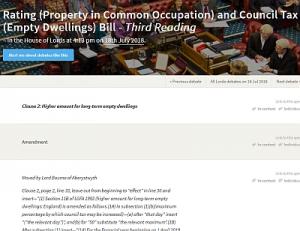



The House of Lords has inserted an amendment into the Rating (Property in Common Occupation) and Council Tax (Empty Dwellings) Bill that introduces an escalator into the amount of Empty Homes Premium payable according to how long a dwelling has been empty. The amendment was supported by the government which suggests that it will be accepted in the Commons.
Following the amendment, a premium of up to 100% of the normal council tax rate for the dwelling - as originally proposed by the Bill - could be imposed if the property had been empty between 2 and 5 years; between 5 and 10 years the premium could be up to 200%; and beyond 10 years, the premium could be up to 300% (or quadruple the normal council tax rate).
The 200% and 300% rates would be available from 2020 and 2021 respectively, with the 100% rate coming into play from April 2019 as originally planned.
Up to the maxima, the amounts chargeable would continue to be set by local authorities according to their own policies, and there is an assumption that the government will produce Guidance to help owners avoid hardship, which can confidently be predicted to open a whole can of worms. Lord Bourne of Aberystwyth, speaking for the government, noted
In particular, we will look to ensure, through the revised guidance, that premiums are applied with due consideration to issues facing low-demand areas and cases of hardship. We anticipate that we will look to strengthen the wording of the guidance to set out the Government’s clear expectation that premiums are not applied where home owners can demonstrate that their properties are genuinely on the market for rent or sale and appropriately priced. We will also look to ensure that the guidance takes account of individuals who are struggling to complete or to afford renovations that are necessary before the property can be occupied or sold on, and where progress or hardship can be demonstrated.
Fair enough, but if we are going to consistent then let's see tribunals set up to start dealing with individuals' 'hardship' caused by income tax and VAT.
Measures to deal with long-term empties are welcome and an EHP escalator can be expected to have a positive impact in reducing empties. But the lack of a wider vision around what is involved in tackling empties and a disregard for what is needed to address the full range of situations remains a concern for practitioners. To take a very simple example, hiking the premium is also likely to have a 'positive' impact on the incidence of council tax avoidance by owners taking advantage of the 'second homes' loophole.
Whilst Empty Homes Premium offers useful PR when it comes to claiming that things are being done about empties, in reality meaningful action should be possible long before a home has been empty for five years. Some obvious contenders for change in policy or legislation would include
- the indefinite council tax exemption for homes that have been left in limbo following the death of an owner as a result of deliberate inaction by the putative heirs (upon whom the amendment will have no effect)
- the Basic Loss Adjustment payable to neglectful owners when local authorities seek to compulsorily purchase properties that may have been a blight on their communities for years
- the farcically loose definition of 'second homes' which provides a ready-made option to avoid Empty Homes Premium
